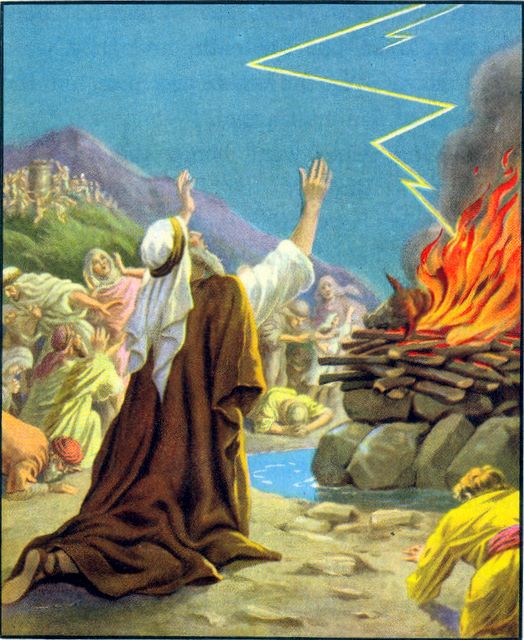
THE ALTAR ON CARMEL.
A FEW months ago we were in Palestine. Taking a steamer at Jaffa (the Joppa of the Bible), we went by night to Beirut, the beautiful city of Syria. Sitting on the deck in the twilight, we strained our eyes to catch a glimpse of Mount Car-mel, so renowned in Bible history,—" fruitful Cannel by the sea." As its dim outline came out against the starry sky, we thought of the scenes which have made this mountain memorable; but chiefly of the events connected with the two great prophets, Elijah and Elisha.
On this mount took place that trial which brought backsliding Israel again to trust in Jehovah as the true and only God. Israel was governed by that wicked king, Ahab, who not only himself bowed the knee to Baal, but drew the people after him. Elijah's righteous soul was stirred within him, and believing that God would vindicate his own cause, he desired Ahab to send and gather all Israel unto him to Mount Carmel, and the prophets of Baal four hundred and fifty, and the prophets of the groves four hundred, that in the presence of all the people it might be proved who was worthy to be trusted,—the false god in whom Ahab and his house believed, or the God of Israel.
Ahab commanded the people to assemble at Car-mel, wondering, doubtless, what would be the end. Then Elijah, strong in his trust in the Lord, thus boldly addressed the waiting throng, " How long halt ye between two opinions I if the Lord be God, follow him; but if Baal, then follow him."
He waited for a response, but the people, awestruck by his appearance, " answered him not a word." Then continued the brave prophet, "I even I only, remain a prophet of the Lord; but Baal's prophets are four hundred and fifty men.
Let two bullocks be brought, and let Baal's prophets choose one for themselves. Then let the bullock be cut in pieces and laid on the wood. I will take the remaining bullock, dress it, and lay it on the altar, but for neither altar shall fire be brought.
When the altars and the sacrifices are prepared, let the priests of Baal call on the, name of their god, and I will pray unto my God, and the god that answereth by fire, let him be God. And all the people answered and said, It is well spoken."
Then the priests of Baal, excited, and no doubt troubled, by such a challenge, began to prepare the victim for their altar. King Ahab and many of his people were there, anxious and expectant•. Allwas at length ready. Then the false prophets fell upon their faces and called on their god to hear their cries, and to show his power ; but there was no voice nor any that answered. From morning un-til the sun of noon poured upon them, they cried and leaped upon the altar, but all in vain. And then, as if to mock them in their extremity, Elijah, the Lord's prophet, said, " Cry out with a great voice, for your god is talking, or pursuing, or in a journey, or perhaps he sleeps, and must be awaked."
Thus taunted, they renewed their cries, and in their frenzy, as the heathen do now, cut themselves with knives and lancets until the blood gushed out upon them. The hot noontide passed, and the time of the evening sacrifice drew near, but no answer was sent to their "despairing cries; and the proud prophets were forced to confess themselves vanquished. Then Elijah, outwardly calm, but with a strange light on his face, as if he had talked with God, came forward, and said unto all the people, "Draw near unto me;" and the waiting, wondering people needed no second bidding.
Elijah then took twelve stones, one for each of the tribes of Israel; and with the stones he built an altar. He next dug a trench in the earth about this altar; afterward he laid wood upon it, and upon the wood, the bullock. Then, calling unto those who stood about him, he said,
"Fill four barrels with water, and pour it upon the burnt-sacrifice and upon the wood." This was quickly done. "Do it a second time," commanded Elijah; and then a third time he commanded that the barrels be filled, and the contents poured over the altar; so the wood was wet, and even the trench overflowed.
Elijah approached the altar, and lifting up his voice, said, "Lord God of Abraham, Isaac, and of Israel, let it be known this day that thou art God in Israel, and that I am thy servant, and that I have done all these things at thy word. Hear me, O Lord, hear me, that this people may know that thou art the Lord God, and that thou hast turned their heart back again."
His prayer being ended, the people waited in silent awe for the answer, and they had not long to wait.
The fire of the Lord fell, and consumed not only the sacrifice and the wood, but even the stones and the dust, and licked up the water that was in the trench. No wonder that when the people saw this great sight, they fell upon their faces, and cried out, "The Lord, he is the God! The Lord, he is the God!"
As we gazed upon Mount Carmel in the calm twilight of that night a few months ago, we longed for the time when in this same goodly land of Syria and upon excellent Mount Carmel the people now dwelling there might acknowledge the God of Elijah as their only King and Saviour.—
H. H. H.,
in S. S. Visitor.